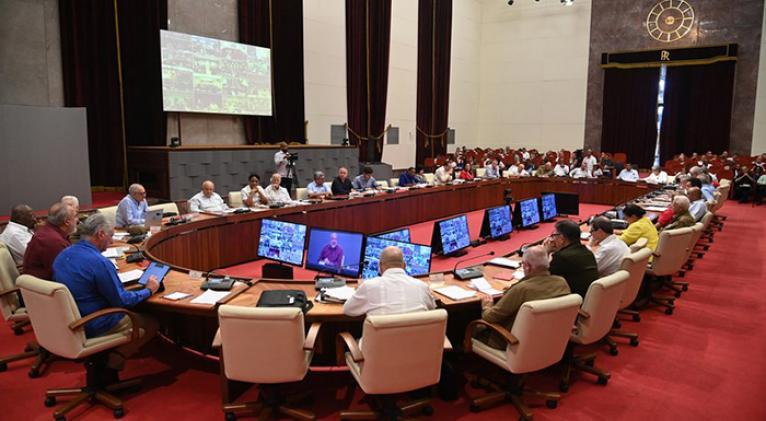Council of Ministers of Cuba is in session

“We have to work as a team, everyone has to feel part of the leadership team of the Revolution, from the municipalities to the country,” stressed the First Secretary of the Central Committee of the Communist Party and President of the Republic, Miguel Diaz-Canel Bermudez, speaking at the meeting of the Council of Ministers, where issues related to the business sector, the allocation of graduates, biodiversity, logistics, gender violence, preparation for the hurricane season and social communication were addressed.
“It is very important that we all prepare well, that we make thorough analysis of each problem to avoid improvisations, that there are spaces to criticize, discuss, build consensus, thoroughly analyze the problems and find solutions”, stressed at the meeting that at the end of each month leads at the Palace of the Revolution the member of the Political Bureau and Prime Minister, Manuel Marrero Cruz.
The moment is difficult, said the president, but difficult does not mean impossible to overcome, we must have the capacity and the conviction that we can overcome this moment; there is a whole inspiration in the revolutionary work and in the call of the General of the Army to Yes We Can!
The Head of State emphasized that what was proposed as an initiative in the days prior to the sessions of the National Assembly of People's Power, associated with a group of actions to advance in the organization of relations between the state and non-state sectors, price control, eliminate tax evasion, and increase revenues to the State Budget to reduce the deficit, will not be stopped.
This has to be the work of every day, with indicators that allow us to measure daily what we are advancing, said Diaz-Canel before more than 500 participants in this session, most of them political and governmental authorities of the territories, connected via videoconference with the Presidency of the Republic.
GOVERNMENT PRIORITIES FOR THE SECOND HALF OF THE YEAR
About thirty projections to correct distortions and boost the Cuban economy are organized in a schedule for their implementation starting in September, informed the Prime Minister at the meeting of the highest government body in Cuba.
“It is a very important level of actions, which are going to have an implementation process that carries the political and communicational accompaniment that has been established,” he added.
There will also be another 57 plans that will be approved and implemented mainly during the second half of the year. These are profound issues, Marrero Cruz clarified, especially related to macroeconomic policies, which need a follow-up and control process so that we achieve the planned objectives.
The working system has to change, insisted the Head of Government, it cannot be the same as the one we had in the first semester.
With all the orientations received from the National Assembly of People's Power and with these government projections that are going to start being implemented soon, a review of the way we are doing things up to now is required, he said.
Marrero Cruz listed the work priorities for the second semester of the year, indicated by the President of the Republic, related to “fighting a battle against bureaucracy and the slowness in responding to many issues”, a major offensive to national production, as well as the implementation of measures related to the budget deficit. He added that “already today the greatest impacts we have had in the implementation of the Government Projections are precisely in the reduction of the fiscal deficit”.
Cuban Premier spoke of the fight against tax evasion, “another issue that is already having results”, and of the organization of the business system, “an issue that will keep us very busy in the second half of the year, because we have to transform our business system structurally, organizationally and functionally”.
He also stressed the need to “win the battle of prices, we cannot rest, it cannot be a campaign, it is a daily work, and all possible forces must be summoned”.
He said that greater impetus will be given to banking, with emphasis on all agricultural markets and food sales establishments, both state and non-state.
Marrero Cruz also referred to the review of the State leases: “we have to see what we have in them, what services we provide, at what prices, we cannot allow that in a government facility the people are mistreated and there are abusive prices”.
In the second half of the year, he announced, we will focus on working with children, adolescents, young people and communities, a main scenario that must continue to be strengthened.
IMPROVEMENT OF THE MECHANISMS OF REMUNERATION FOR WORK IN THE STATE ENTERPRISE SYSTEM
The Minister of Labor and Social Security, Marta Elena Feito Cabrera, described as a revolutionary measure the “Proposal for the improvement of the mechanisms of remuneration for work in the Cuban state enterprise system”, presented to the Council of Ministers and which also responds to the fulfillment of the Government's projections to correct distortions and boost the economy.
It is proposed, she said, to establish as “the power of all the entities of the state enterprise system to determine the organization of their salary system, under principles of equality, differentiation, proportionality, respecting the minimum salary in the country”.
It is amended to eliminate selectivity and prior authorization to implement the salary organization, therefore, it will be applicable to all the entities of the state business sector.
Feito Cabrera pointed out that there is a differentiated treatment for companies engaged in universal public services or exclusive activities of the State, for those that guarantee access to goods and services, those of high technology, and those of computer applications and services.
Likewise, it is intended to generalize the application of pay for performance systems to all workers, a recurrent claim of employers, where the planned amount will not be less than 30%.
Workers will be protected up to the limit of the basic salary of the previous year, in the event of deterioration, default or economic losses.
The proposal, the Minister commented, “contributes to increase the contributions to the State Budget; advances in the transformation of the workers' income structure; generates more stability of human resources and the improvement of their management; eliminates obstacles that limit the autonomy and responsibility of the cadres; and favors greater participation of the union movement and the workers in the design and approval of the salary organization”.
Marrero Cruz warned of the need not to lose essential principles such as the wage-productivity relationship, as well as the approved destination of corporate profits.
2025 GRADUATE ASSIGNMENT PLAN
The estimated number of graduates in Cuba for the next academic year is 47,171 students, 40% in higher level careers, 7% are higher technicians, and 53% are mid-level technicians, according to the Minister of Labor and Social Security to the Council of Ministers.
She explained that priority is given to assigning graduates to biopharmaceutical and food production, railway and electro-energy programs, tourism, science, technology and innovation, higher education, construction, defense and internal order, among others.
Feito Cabrera warned that the estimated number of graduates for 2024-2025 is “6,173 students less than in the present course, this is impacted by the aging population of the country”.
Of the possible higher level graduates, 69% belong to Health, Education, Sports and Culture; by sectors, 30,438 young people are located in the budget sector and 10,500 in the business sector.
Currently, some 4,195 young people are awaiting early admission for pre-professional internships and the completion of their studies; most of them are middle-level technicians from the provinces of Granma, Camagüey and Las Tunas. According to the Minister, analyses are being carried out with the agencies in order to ensure 100% placement by October.
On this important issue, Deputy Prime Minister Jorge Luis Perdomo Di-Lella considered that an adequate coordination must be achieved between municipal development strategies, the survey of skilled labor force needs and the training of specialists.
He also said that it is necessary to guarantee the fulfillment of the Social Service of these young people, this is a law in our country, it is an obligation; and it has to do with their training, but also with their contribution to society after they finish their studies. At the same time, he warned that many times this work force is not adequately utilized, therefore, they become unmotivated during the work training period.
GENDER VIOLENCE IN FOCUS OF ATTENTION
The Council of Ministers approved in this session the “National System for registration, attention, follow-up and monitoring of gender violence in the family scenario”, an important proposal presented by the Attorney General of the Republic, Yamila Peña Ojeda, and which follows up on the Program for the Advancement of Women.
According to her, “a group of 25 experts was formed, jointly with the Ministry of the Interior and the People's Supreme Court, for the development of a computerized and interoperable administrative registry, which would use the platforms of these institutions for the management of criminal proceedings”.
This administrative registry, emphasized the Attorney General of the Republic, is intended to have statistical information for the prevention in the fight against gender violence.
Peña Ojeda exposed elements obtained from the administrative registry during 2023, among them that 75% of the facts took place in the home, a trend that continues this year; 72% corresponded to victims between 25 and 59 years old; 45% are unpaid workers; and likewise were identified the survivors who suffered mistreatment during the relationship and those who made previous complaints for threats or injuries, sometimes withdrawn as part of the cycle of violence.
It was learned that 84% of the perpetrators were intimate partners or ex-partners; 46% had a ninth grade education; 40% had a work relationship; and 31% had a criminal record of violent acts.
Peña Ojeda detailed characteristics indicative of gender violence, among them, that they acted in a position of dominance; some were unhappy with the breakup of relationships; a number took advantage of the presence of children to inflict more suffering; as well as the use of bladed weapons or firearms, or the aggressors' own hands.
In this sense, she pointed out that it is vitally important to produce statistics and comprehensive information to measure the violent death of women and girls for gender-related reasons.
“The implementation of the National Registration System and the transparency of the results strengthens the rule of law, contributes to discouraging manifestations of violence, combats impunity, raises the legal education of the population and strengthens the social fabric around a problem that concerns everyone,” stressed the Attorney General.
PREVENTION IN THE FACE OF A VERY ACTIVE CYCLONIC SEASON
For the current hurricane season, there is an estimated 80% probability that Cuba will be affected by a hurricane; there is a 90% probability that it will be hit by a tropical cyclone; and a rainy season with above-average accumulated rainfall is expected in all regions of the country.
During June, the month with the highest historical average rainfall of the year, the national accumulated rainfall reached 121%; in the west it rained 154% of the regional average, in the center 103% and in the east 107%.
These data were presented by the first colonel Luis Macareño Veliz, second chief of the National General Staff of the Civil Defense, who presented the indications to face a very active cyclonic season, among them “to increase the preparation of the organs, management structures and the population; to punctuate the availability of the early warning systems, the monitoring of the flooding areas in low and badly drained zones; and to increase the cleaning of the riverbeds and the maintenance of the protection works against fluvial and coastal floods”.
He also insisted on reviewing the certification status of the emergency generators and increasing their technical availability; checking the micro-dams and adopting measures to ensure their technical control.
Macareño Veliz pointed out the maintenance of grounding systems and protections against electric discharges; protection measures in installations with electric motors; and actions to ensure the protection of resources in large warehouses.
He referred to the plans to ensure the collection, storage and distribution of agricultural products, the basic food basket and chemical products for water treatment. In addition, the primary health services and the epidemiological surveillance system, with attention to diseases associated with the rainy season.
On this point, Deputy Prime Minister Ines Maria Chapman Waugh warned that each territory must be reviewed, because there are places where there are urban disorders that lead to flooding, and an element that has already hit us is the issue of solid waste and the dragging of sewage into the sewers that cause major obstructions.
Prime Minister added on this point that “many times the perception of risk is almost absent and until the phenomenon arrives we don't start rushing”. It is important to work under the assumption that one of these events will pass through the country. The preventive part plays the main role: “everything we can prepare ourselves to avoid problems”.
MORE ITEMS ON THE AGENDA
The Council of Ministers also approved the National Logistics Policy, presented by the Minister of Transportation, Eduardo Rodriguez Davila, the result of several years of study on an issue of great relevance that affects all sectors of the economy and the life of the nation.
It also approved the proposed National Program on Biological Diversity until 2030, presented by the Minister of Science, Technology and Environment, Eduardo Martinez Diaz.
In addition, the progress of the implementation of the organizational process of the Institute of Information and Communication was presented, as well as the Law of Social Communication.














Add new comment